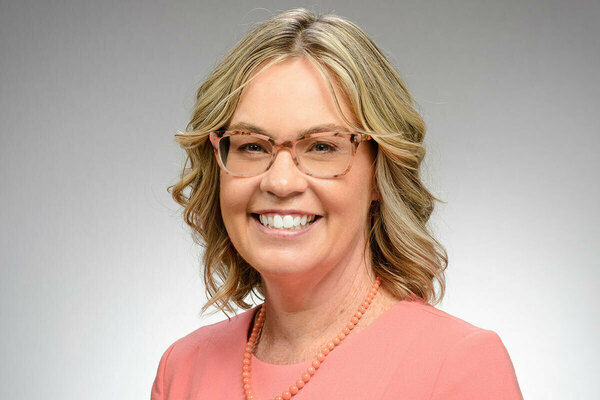
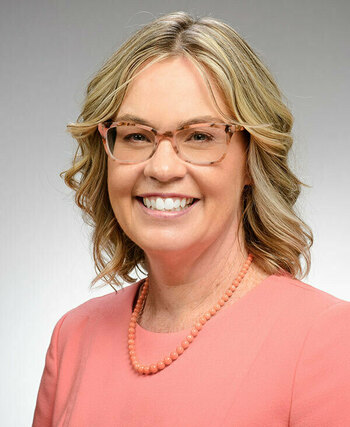
On her first day teaching at Notre Dame in the late 1990s, then-doctoral student Kathleen Sprows Cummings asked her undergraduates in Ethnicity and American Identity to share why they were taking the course.
“Nothing else was open,” was the first reply. It wasn’t the only one.
“Thirty-eight students in a row repeated that line,” Cummings said with a laugh.
Times change.
Cummings is now the Rev. John A. O'Brien Collegiate Professor of American Studies and History and director of the Cushwa Center for American Catholicism. And students flock to her courses — including Notre Dame and America, Faith and Feminism, and Sanctity and Society — no matter what else is available.
She’s also now the winner of the 2021 Sheedy Excellence in Teaching Award, the highest teaching honor in the College of Arts & Letters. Created in 1970, it honors the Rev. Charles E. Sheedy, C.S.C., who served as A&L dean from 1951 to 1969. She will accept the award during a ceremony on Tuesday, Dec. 7, at 3:30 p.m. in the Morris Inn’s Smith Ballroom.
One member of the Class of 2022 who took two courses with Cummings credited her with making an “irreversible, significant” impact on her life.
“She has shaped me into a better student, Catholic, woman, and member of society,” the senior wrote in her letter recommending Cummings for the award. “I strive to become the type of woman and professional that she is.”
“She has shaped me into a better student, Catholic, woman, and member of society. I strive to become the type of woman and professional that she is.”
‘Teaching history is sacred’
The criteria for the Sheedy Award? Display excellence in research and instruction, motivate and enrich students using innovative and creative teaching methods, and influence teaching and learning within the department, College, and University.
Peter Cajka, director of undergraduate studies in the Department of American Studies, said Cummings checks all those boxes. And more.
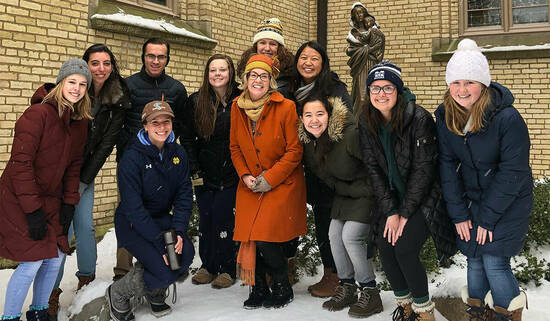
In support of her nomination, Cajka applauded her intellectual courage and deep commitment to excellence, including as an educator who is “unstintingly generous in her efforts to mentor young scholars.”
The profession, Cummings said, deserves no less.
“Teaching history is a sacred task,” she said. “What a privilege to work with young people. I love to be with them as we contemplate life’s big questions together. The 75 minutes that I’m with them in class are the most important 75 minutes in my day.”
Those 75 minutes, an alumnus said in his recommendation letter, were meaningful to him, too.
“Professor Cummings brought enthusiasm, wit, mastery of material, and passion — for the University and her students — to every single class meeting,” he wrote.
She’s known for much more than her teaching. Cummings’ 2019 book, A Saint of Our Own: How the Quest for a Holy Hero Helped Catholics Become American, has received rave reviews. Her first book, New Women of the Old Faith: Gender and American Catholicism in the Progressive Era, earned three 2010 Catholic Press Association Awards.
And the nationally recognized expert on Pope Francis and Catholicism also provides context and perspective for television and print media on other topics, including President Joseph Biden and the HBO series Mare of Easttown.
In the classroom, Cummings’ creative instructional techniques — small group work and discussion, films, and visits from members of the Notre Dame and South Bend communities — appeal to students. So does her penchant for classes meeting elsewhere — the University Archives, Holy Cross Cemetery, the Grotto, the God Quad, in front of the Log Chapel, and the basement of the Basilica of the Sacred Heart — in an effort to deepen their understanding of the topics they’re studying.
“Professor Cummings valued the lives of every single person on campus, with all our similarities and differences,” one student wrote. She “managed to make material as old as time — The Bible, and its history — come alive with connections from today.”
‘A kindred spirit’
Who history remembers, Cummings posits, has implications for everyday life. That’s why she strives to highlight people beyond presidents and popes, including women and other hidden figures.
When she was a doctoral student, Cummings remarked to a faculty member that the courses she had taken about Catholicism didn’t include women, and the courses about women’s history didn’t include Catholics.
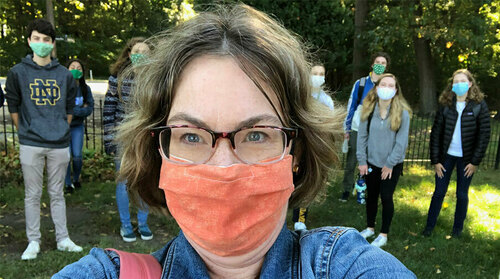
The professor told her that she could do something about that. And so she has.
The lives and experiences of Catholic women have been a hallmark of her research and teaching, including in spring 2020, the day classes resumed online after in-person sessions were suspended due to the coronavirus pandemic.
Cummings set aside the assignment listed on the syllabus, and instead asked students to read stories gathered from Catholic sisters living in Philadelphia during the global 1918 influenza epidemic.
These women, who hadn’t ventured outside their convent grounds in decades, suddenly left to care for people in nursing homes and hospitals during the outbreak, in which about 50 million people died worldwide and about 675,000 perished in the United States.
Their testimony, Cummings said, demonstrated what it means to be human in the midst of tragedy and uncertainty. It provided solace for students, including one who later shared that absorbing the energy of these women of the past helped her release the toxins of her own anger and sadness.
In another course on Women and Catholicism, an assignment to interview a sister about why she devoted her life to the Church dramatically shifted one student’s perspective.
The first day the class met, the student had predicted that, considering women’s limited roles in the Church, the course wouldn’t have enough material to last more than a couple of weeks. Getting to know a Catholic sister, though, helped the student understand the impact women had on church society — and see just how much they had in common.
“She had met a strong, independent woman — a kindred spirit,” Cummings said.
“Anyone who truly loved what they studied in college had a professor or advisor who made them think, ‘I want to be like them one day.’ For me, that was Professor Cummings.”
‘Important and deep questions’
Watching students grow throughout their academic careers has always been an honor, said Cummings who, aside from a two-year Lilly Fellow postdoctoral position at Valparaiso University, has spent her entire career at Notre Dame.
To facilitate that development, she holds office hours at night to better accommodate student schedules. And she routinely invites classes from prior years to gather for coffee, lunch, and happy hour.
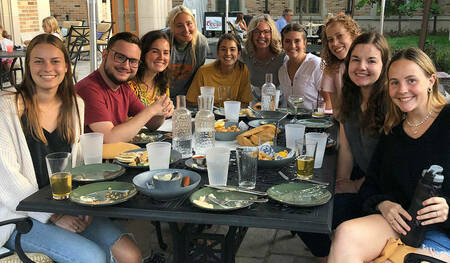
“Her suggestion to reunite with my class this year is evidence of her sustained interest in her students as people, not just students,” a member of the Class of 2022 wrote. “I believe that education means very little if it lacks meaningful connection, and Professor Cummings is the embodiment of this standard.”
Cummings appreciates that she can teach and design courses that mesh with her research interests, including the history of Catholicism in the United States, American women, and the relationship between religion and American society.
In creating her popular Notre Dame and America course, Cummings challenged students to ask “important and deep questions about what it means to be Catholic and American,” said Jason Ruiz, chair of the Department of American Studies and the 2019 Sheedy Award recipient.
“Kathy challenges her students to consider all aspects of some of our most beloved institutions,” he said. “She never shies away from staging difficult conversations that deepen students’ understandings of complex histories and realities, but always does so with great sensitivity and care for her students.”
Students, she said, are also very much part of the story of Notre Dame and part of the story of America.
So, too, is Cummings.
“Anyone who truly loved what they studied in college had a professor or advisor who made them think, ‘I want to be like them one day,’” wrote an alumna. “For me, that was Professor Cummings.”
Originally published by at al.nd.edu on November 29, 2021.